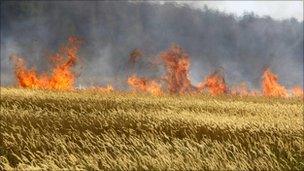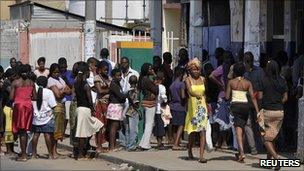UN calls meeting on food price concerns
- Published

The summer heatwave destroyed crops in many parts of Russia
The United Nations' food agency has called a special meeting of policy makers to discuss the recent rise in global food prices.
The announcement came after Russian Prime Minister Vladimir Putin extended the country's ban on grain exports on Thursday.
This added to fears that prices of food staples would continue to rise.
The meeting will take place on 24 September, probably in Rome, the UN Food and Agriculture Organization said.
"In the past few weeks, global cereal markets experienced a sudden surge in international wheat prices on concerns over wheat shortages," the agency said.
"The purpose of holding the meeting is for exporting and importing countries to engage in constructive discussions on appropriate reactions to the current market situation."
Heatwave
Mr Putin did not say when exactly the Russian grain export ban, originally to run from 15 August to 31 December, would be lifted, but said that it would not be before next year's harvest had been reaped.
Russia is one of the world's biggest producers of wheat, barley and rye and was hit hard by a drought this summer.
The heatwave destroyed crops in many parts of the country, pushing food prices up.
This year's crop could be as low as 60 million tonnes, but Russia needs almost 80 million just to cover domestic consumption, analysts say.
Other key grain producers have also reported shortages, causing the price of wheat on international commodities exchanges to rise more than 50% since the beginning of July.
Supplies
Grain prices on commodity markets shot to near two-year highs last month as investors digested worsening news of the Russian harvests.

Bread queues form in Maputo, where price rises have sparked unrest
The FAO is concerned at the speed at which prices have increased over the last two months.
Its economist, Abdolreza Abbassian, said the latest Russian move to extend the ban would prolong the "volatility and anxiety" already on the markets.
But the UN agency has stressed throughout that the situation is very different to the food crisis two years ago.
Prices are currently lower, production levels higher and stocks more abundant than during the 2007-8 period, when shortages sparked riots across the world.
"It still does not mean that we are going to have a crisis," Mr Abbassian said.
"It does highlight a very big problem here: a very large exporting country with a great influence on the market can make unilateral decisions like that. It causes disturbances of the market."
Impact on consumers
The effect of rising wheat prices is reflected in the FAO's global food price index, which covers 55 food commodities. This week's report said it had hit its highest level for two years in August, largely driven by higher wheat prices.
Last month's 5% rise was the biggest month-on-month increase since November 2009, the FAO said.
Higher grain prices could feed through to products such as bread and beer. But as they are also used as animal feed, they could also drive up the prices of dairy products, eggs and meat.
Analysts suggest that competition could soften the impact on consumers, with retailers and producers unwilling or unable to pass on in full higher raw material costs to shoppers.
Some big food companies have also already signed future supply contracts at prices that are lower than on international commodity exchanges.
Unrest
Rises will be felt more keenly in developing countries, where food makes up a bigger proportion of household spending.
Higher prices caused people to take to the streets in the Mozambique capital Maputo this week, resulting in violence in which seven people were killed.
Pressures such as a weakening currency have caused bread prices in the southern African country to rise 30% so far this year.
"There are other issues at play there - which is not uncommon in poorer countries," Mr Abbassian told BBC World News.
"Even a small increase in the price of food, which is so important to them... can spark a problem.
"Food prices, and wheat in particular, are so important for food security and even the political stability of countries."
- Published31 May 2011
- Published3 September 2010
- Published6 August 2010
- Published2 September 2010
- Published26 August 2010